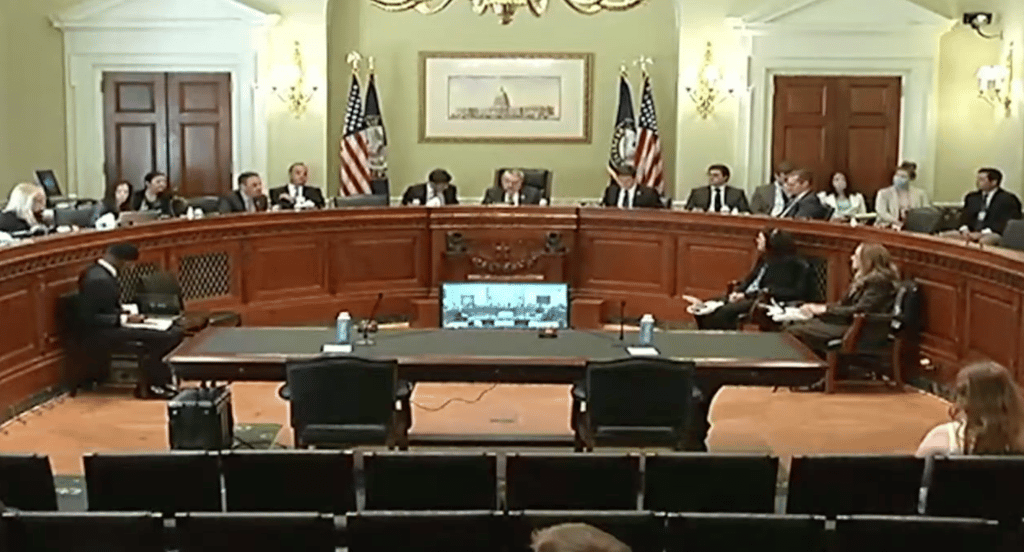WASHINGTON (CN) — Two days after the Senate torpedoed, for the second time, legislation aimed at stopping voter suppression, Democrats took up the effort anew in the House on the eve of a solemn anniversary for their cause.
Eight years ago Friday, the Supreme Court largely gutted the 1965 Voting Rights Act with a 5-4 ruling in Shelby Co. v. Holder.
“It completely reshaped the landscape of voting rights and protecting rights to vote in this country,” Representative G.K. Butterfield who chairs an elections subgroup under the Committee on House Administration, said in a Thursday morning hearing. “Since that decision, access to the ballot has been under constant attack.”
The decision struck out two key provisions of the VRA, including Section 5, which required states and localities with a history of voting discrimination to get federal preclearance before implementing any election changes.
“It stopped us from preventing negative things from occurring instead of waiting for negative things to occur then trying to make things better,” said Eric Holder, an Obama-era former U.S. attorney general who chairs the National Redistricting Committee.
“If almost as if you see someone getting ready to set fire to a house, you can stop them and prevent the damage," Holder explained, "as opposed to waiting for the fire to engulf the house and then trying to repair the house once the fire is put out."
Democrats argue that minority voters pay the price when states purge their rolls of supposedly inactive voters, require voter ID, close polling places and cut backs on early voting, and otherwise enact curbs to voter registration.
Patty Ferguson-Bohnee, director of the Indian Legal clinic at the Sandra Day O’Connor College of Law, noted the example at the hearing of how Native American voices are diluted when tribal boundaries are ignored and voting locations are inaccessible. Nonstandard addresses means that voters could be placed in the wrong precinct, creating confusion and resulting in discarded ballots.
-

Representatives attend an elections subcommittee hearing on new standards limiting the right to vote at a Thursday hearing. (Image via Courthouse News) -

Rep. Brian Steel, R-Wis., speaks at an elections subcommittee hearing on new standards limiting the right to vote at a Thursday hearing. (Image via Courthouse News)
In the 2021 legislative session, Republican lawmakers in 48 states have introduced 389 bills, 22 of which have been enacted into law, that Democrats say restrict voting.
Republicans have come up dry in their quest for evidence of voter fraud in the 2020 election, yet they defend their efforts as necessary to restore trust in the electoral system. The committee's ranking Republican member repeated these claims Thursday.
“It’s all part of an effort to convince the American people that the laws being passed by states are so racist or suppressive that the only option is for the great, benevolent federal government to take over,” said Representative Brian Steil of Wisconsin. “This is a dangerous and false narrative.”
In 2019, the Brennan Center for Justice reported that states formerly subject to federal oversight under the VRA have seen voter purges at a rate of 40% higher than the rest of the country since 2016 — meaning about 17 million voters were removed from the voting rolls in just three years.
“Efforts to keep groups of Americans, particularly Black Americans, away from the ballot box are as old as America itself, and the same forces that have historically sought to create an unequal status quo are still working to impose it today,” said Holder.
And though Black Americans turned out in record numbers this past election, activists say that it was still lower than it could have been.
“The celebrated turnout rates among Black voters occurred despite a litany of unequal obstacles and because of herculean efforts by civil rights groups, organizers and activists and Black voters' sheer determination and resilience,” said Janai Nelson, associate director-counsel of the NAACP Legal Defense Fund. “This model is not sustainable or acceptable.”
Earlier this month, more than 100 scholars and university professors signed a letter calling for increased federal voting protections, to curb what they call “radical changes to core electoral procedures.”
“Collectively, these initiatives are transforming several states into political systems that no longer meet the minimum conditions for free and fair elections,” the scholars wrote.
The letter was published by public policy think tank New America.
“The deterrent effect was Section 5’s genius,” Nelson told lawmakers at the hearing. “It stopped discrimination before the harm occurred. We urgently need that prophylactic legislation now. It is unacceptable that in 2021, 50 years after the VRA’s passage, the right to vote remains so very under protected.”
On Friday, the Supreme Court is expected to rule on a pair of Arizona laws previously struck down for suppressing minority votes. This is one of the last cases of the term and its resolution is hotly anticipated.
Subscribe to Closing Arguments
Sign up for new weekly newsletter Closing Arguments to get the latest about ongoing trials, major litigation and hot cases and rulings in courthouses around the U.S. and the world.









